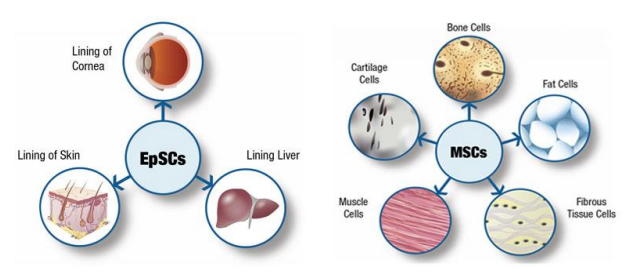|
Becoming first-time parents sure comes with lots of stuff (and costs) to think about. One of the key concerns we had was whether we ought to store our baby’s cord blood – our gynae and relatives were for it, but the sentiments online were mixed.
We’ve always heard that storing a baby’s cord blood was expensive, but when we enquired, the costs were honestly much lower than what we expected. At just $5,000+ to store our baby’s cord blood for 21 years, that works out to be less than $20 a month – even lesser than what we pay for (financial) insurance!
|
| Image credits |
Stem cells have the immense potential to treat cancers and blood disorders, and have shown promising results thus far in many clinical trials which are ongoing for regenerative therapies. This is largely due to their unique ability to transform into specialized cells which are able to perpetually create more copies of themselves.
At present, over 35,000 cord blood transplants have already been performed around the world to treat various diseases. In fact, I see it as a form of insurance (like what I told my husband when trying to convince him that the cost was worth it), except that it is even better than typical (financial) insurance because whereas those can only cover or offset costs, this form of biological insurance has the potential to treat and cure the condition!
When we asked around, it turned out that most Singaporean parents choose either to:
– store with a private bank
– donate it to the public bank
– discard it entirely (what a waste!)
However, our journey towards deciding whether to bank our child’s cord blood (and later on, WHICH company to choose) wasn’t as straightforward as we thought it would be.
We met up individually with the sales representatives of Cordlife, Stemcord and Cryoviva, and even spoke to Singapore Cord Blood Bank (SCBB), but received such conflicting advice that we were honestly stumped whether or not to privately store or donate it. It didn’t help that when we asked around, there were many who shared that they donated their baby’s cord blood to SCBB instead of choosing to store it privately.
But when I dug further, it turned out that SCBB rejects most of the donated samples. Read more here on why I didn’t think donating my baby’s cord blood to SCBB was a good idea after speaking with SCBB, Cryoviva, Stemcord and Cordlife.
This article also provides another point of view that encapsulates ours. This line really resonated with me:
Why pay a few thousand dollars to privately bank your baby’s cord blood when you can donate it for free to a public cord blood registry? If your child ever gets sick, you can just look for a “match” in the public registry and it should be there, right? Wrong.
Wait, isn’t cord blood banking a scam?!
After spending weeks researching on this issue, I most certainly do not think so.
Science and technology has developed so much such that today, stem cells from cord blood has been proven useful in the treatment over over 80 diseases. The figure was less than half just a decade ago. With over 800+ clinical trials ongoing around the world, and as scientists continue to find new ways of using stem cells for treatment, just imagine how much more potential we could discover in the near future. Some new areas where research into cord blood stem cells is currently being done include brain injury, juvenile diabetes, cerebral palsy, congenital heart defects, hearing loss, liver disease, spinal cord injury, and more.
The umbilical cord blood and lining contains three types of stem cells – haematopoietic, epithelial and mesenchymal stem cells – which have shown immense potential in not just treating various diseases, but also aiding the repair of injured tissues and organs.
Of course, it is still fairly early days, but the cord blood banks are already saving lives (SCBB and Cordlife have had many cases of successful transplants) and as research continues, it is very likely that in the future, more ways of using cord blood to treat more diseases may be found. Don’t forget that these undifferentiated cells contain a powerful ability to specialise into different cell types, which is where their promise of treating diseases lie in.
The science is exciting! Who knows what the future will bring, and what more we will discover? I don’t want to have to rule out the possibility for my child and my family just because we decided not to bank it to save a few thousand bucks – like what my husband said, he’ll rather forgo one family holiday and spend the money where it matters…for health.
Can’t stem cells be used from other sources aside from cord blood?
Indeed, haematopoetic stem cells can also be obtained from the adult bone marrow, but not all transplants work out either. On the other hand, cord blood stem cells require a less stringent HLA matching compared to bone marrow stem cells, and also a lower risk of developing graft vs. host disease.
The cost is also significantly different – it can cost up to $64,000 to procure a matching unit for bone marrow or public cord blood banks (or up to $40k provided you’re lucky enough to find a match in SCBB locally), whereas it costs nothing if you had banked it privately for your own family’s use.
Should I store just the cord blood, or the cord tissue as well?
This was another difficult decision we had to make, because it meant paying more if we wanted to store more than just the cord blood stem cells. So I did more research and spent hours on Google Scholar to understand more about the three types:
|
|
Haematopoietic
stem cells
|
Epithelial stem cells
|
Mesenchymal stem cells
|
|
Can differentiate into…
|
Healthy red blood cells, white blood cells and platelets
|
The soft tissues that connect, support or surround certain structures or organs in our body including the lining of the cornea, skin and liver
|
Structural tissues – bone, cartilage, muscle, fibrous tissues, and fat.
|
|
Can be used to treat
|
Blood diseases or cancers such as leukaemia, immune-deficiencies, metabolic disorders, refractory anaemia, tumors, bone marrow failure, etc.
|
Soft tissue repair (eg. diabetic surface ulcers, burns on skins), organ lining regeneration (liver, pancreatic or gastrointestinal lining), and even eye (to replace cornea membrane)
|
Tissue repair (eg. in stroke patients, heart failure, Alzheimer’s disease, Parkinson’s disease, spinal cord injury, repair of the bone, catrilage and/or tendon, liver failure), immune modulation (HIV, type 1 diabetes, Graft vs. host disease)
|
|
Source
|
Cord blood
|
Cord lining
|
Cord tissue (Wharton’s jelly)
|
Some other common concerns we found online (on Hardwarezone forums) were:
1. During labour, if the gynae missed something and the cord blood is not sterile, it will be rejected and you will still need to pay –> this is not true, as there is no payment if your cord blood is not viable for storage.
2. Why not donate it to the cord blood bank which is free, and you’ll get the cord blood within one year if you need it? –> This is not entirely true as it may have already been discarded (without your knowledge!) or used by someone else. Read what I discovered about SCBB here.
3. If you do not have hereditary blood problems, chances are, you will not need it –> not true, as certain blood disorders develop as a result of the environment. Moreover, if one’s blood condition is hereditary, then all the more their cord blood will NOT be suitable for usage, since it would have already contained the genetic defect anyway!
4. They are so freaking expensive…they use the fear of humans to make them sign up –> “expensive” certainly is a subjective term, but for as low as $19 a month, if you can afford it, I think it is a small price to pay for such biological insurance. Even my monthly premiums for hospitalisation insurance costs wayyyy more than that, and my ISP cannot treat me (it can only waive off my financial bills), whereas cord stem cells offer me at least a chance of treatment or even a cure!
If you can afford to go on holiday or spend on expensive tuition for your kids, I believe one can most definitely afford to do cord blood banking.
All in all, I do NOT think cord blood banking is a scam at all, and in fact, after spending hours researching on whether to store or even donate, I’m even more sure that for any parents who can afford it, private cord blood banking is the way to go.
The last thing you’ll want is (lest anything happens in the future) for you to have looked back in regret and think, if only I had banked my child’s cord blood!
I know I don’t want to have, or live with, that sort of regret.
Next up, I’ll be comparing between the different options and plans for cord banking in Singapore!
With love,
Budget Babe







12 comments
Why isn't donating to SCBB a good idea? I didn't see any links to another post with your explanation. I donated my #1's cord blood. I read that if it can't be donated/stored for whatever reason, it will be used for research purposes.
Moreover, as of now, cord blood can only be used to treat very few diseases. Perhaps this will change in many years to come. Cord tissue can so-called treat many diseases including diabetes (something that interested me a lot when I heard the Cryoviva staff mention), but upon reading their pamphlet, I realised it is only at the clinical trial stage. ONLY IF your doctor recommends going to such a clinical trial that uses the cord tissue then it will be of use.
With this info, I think I will still donate #2's cord blood. May it help someone in need. Should I really need it at some point, I feel I will be blessed in return.
This comment has been removed by the author.
This comment has been removed by the author.
This comment has been removed by the author.
First of all, I am a blood doctor so I know what I am talking about but these are my personal views. I do not represent my employer. And I apologise in advance for the lengthy post.
Cord banking is a good thing to do but Only for public banks like SBBB. It is true that your cord may be rejected and the hours of banking are limited due to manpower. But if your cord is being rejected by SBBB and kept by the private banks then the question is whether the private banks are keeping something that should be rejected? After all, you can't really check right?
Not all private banks are the same, I must admit I didn't bother looking into them as I think its a waste of money but if someone wants to waste money, then you should ensure that their protocols are robust to check viability (cells are still alive) before freezing. What is the backup generators in case of power failure. Do they have personnel on call that can monitor. Where is the storage facility? In Singapore or elsewhere. If elsewhere then is the country secure etc.
A reason for banking is that your child may need it in the future. So let's discuss that. If your child developed leukemia or other blood cancer, you will not be using that cord as its the same type as you and hence your cancer and there would be little immune effect to kill the cancer cells. The others reasons listed using the cord lining and Wharton jelly is still experimental. So maybe there will be use in the future. But we are also moving towards 'off the shelf' cellular therapy, so these technologies using stem cells from cord may not be standard (because difficult to source and expensive). Thus you may have the stem cells but if no ones developing the use for it, it's also useless. So banking on using the cord for treatments that are not developed yet is like buying toto. You bank in the hope that the technology will eventually use the cord stem cells for some condition (not cancer for the reasons listed above).
And there is also altruism. Donating to the public bank is in the hope that it will help another person, like donating blood or signing up as bone marow donor. You shouldn't donate to the public bank and hope to use it in the future if you have that intent, then bank privately. I disclose that for my two kids, I tried to donate to the public bank but as I delivered on the weekend, the banks couldn't accept them. But knowing that, would I have wished to bank in private labs instead? DEFINATELY NOT!
I was approached by SCBB representative recently and discovered that they do offer banking service as well! And their charges are cheaper for $1000 for every 5 years at a renewal basis… this service is relatively new started since last year November BUT it is only currently available for patients in govt restructured hospitals … cord blood definitely is useful for blood diseases as scbb has on their website.. like what mgm says , if touch wood that's the case, cord blood can only be used from other family members which I think is wise to store for other babies too !
Not sure how to edit but thought i should clarify first haha .. I meant if touch wood the baby has blood diseases and cannot use the stem cells … Well, it explains why I would prefer to store for all the kids so the source can be retrieved from other family members
No links yet because I'm still writing the article! Please hold on a while longer, I can't possibly research + write finish everything overnight haha.
To me it doesn't matter whether or not it is being used for research purposes – my key intention is to ensure that my baby's cord blood will be there and available in the future when we need it. I'll consolidate everything on the SCBB post shortly, then you can read and decide for yourself what is best for you and your family!
I'll address all those in a later post (it's already being drafted, but still in point form, I still need to edit and make it into long-form before publishing). some of what you've raised, such as if your child developed the cancer their cord stem cells wouldn't supposedly be useful because it contains the same genetic defect…I've been reading up on this and speaking to different people as well before coming to a decision on where we stand. please do stay tuned for my post once I'm done writing it and let me know what you think then!
And agreed that not all private banks are the same, which is why I'll be doing a comparison post as to what I found after having spoken and met each of the 3 private banks here in Singapore individually. For the one that I'm going with, I've also done my due diligence, some of which you highlighted, but also more:
– what are the backup generators in case of power failure
– where is the building and who owns it, any chance of it being forcefully taken back and all the stored cord blood being lost
– what happens if they shut down
– what are the personnel and IT monitoring systems in place
– what are the processes in place to ensure viability of cells before it is stored
– how do they ensure there is no contamination
and more! the sum is not a small one so obviously I'm gonna do due diligence prior to deciding WHICH private bank to store it with.
indeed, I like that SCBB has launched their family banking initiative this year so in that sense they're also offering a sort of private banking service – and I've compared this to the other private banks but costs-wise…it actually works out to be about the same.
more on this in my other post, please give me some time to write! I'm still consolidating my research and want to make sure I've fact checked everything before I publish anything in the public domain.
just to share my 2cents as i'm a supporter of private cord blood storage. the son of a friend of mine has had to use his own cord blood stem cells for treatment here in singapore.
i've done my fair share of research and cord blood stem cells aren't just used only for blood cancers or blood related diseases. furthermore, not all cancers are genetic – some are caused by lifestyle or environmental. in such cases, cord blood has been successfully used.
i have read many ongoing clinical trial studies to use cord blood to treat other conditions like autism (which has been quite successful to date), cerebral palsy, etc. so i'm not really sure what you mean by 'no ones developing the use for it'.
there are also ongoing studies to expand cord blood stem cells – so it's not accurate that private cord blood banks are storing something that should be rejected. sometimes for parents, all it takes is a better quality of life for their child.
while i support private storage, it's entirely anyone's choice what they intend to do with their baby's cord blood. i think it's more important that they do not discard it.
just my 2cents.
Post is up! You can view SCBB charges here. As you can see, it isn't that much cheaper compared to the private banks, which was surprising to me.
https://www.sgbudgetbabe.com/2018/09/should-i-store-or-donate-my-babys-cord.html
Comments are closed.